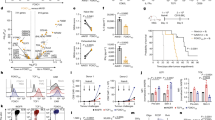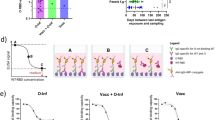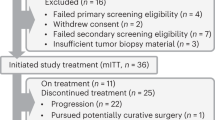Abstract
This trial tested a dendritic cell (DC) therapeutic cancer vaccine in which antigen is loaded using a novel non-viral transfection method enabling the uptake of plasmid DNA condensed with a cationic peptide. Proof of principle required the demonstration of diverse T lymphocyte responses following vaccination, including multiple reactivities restricted through both major histocompatibility complex (MHC) class I and II. Patients with advanced melanoma were offered four cycles of vaccination with autologous DC expressing melan A and gp100. Disease response was measured using Response Evaluation Criteria in Solid Tumours. Circulating MHC class I- and II-restricted responses were measured against peptide and whole antigen targets using interferon-γ ELIspot and enzyme-linked immunosorbent assay assays, respectively. Responses were analyzed across the trial population and presented descriptively for some individuals. Twenty-five patients received at least one cycle. Vaccination was well tolerated. Three patients had reduction in disease volume. Across the trial population, vaccination resulted in an expansion of effector responses to both antigens, to the human leukocyte antigen A2-restricted modified epitope, melan A ELAGIGILTV, and to a panel of MHC class I- and II-restricted epitopes. Vaccination with mature DC non-virally transfected with DNA encoding antigen had biological effect causing tumour regression and inducing diverse T lymphocyte responses.
This is a preview of subscription content, access via your institution
Access options
Subscribe to this journal
Receive 12 print issues and online access
$259.00 per year
only $21.58 per issue
Buy this article
- Purchase on Springer Link
- Instant access to full article PDF
Prices may be subject to local taxes which are calculated during checkout





Similar content being viewed by others
References
Ueno H, Klechevsky E, Morita R, Aspord C, Cao T, Matsui T et al. Dendritic cell subsets in health and disease. Immunol Rev 2007; 219: 118–142.
Gilboa E . DC-based cancer vaccines. J Clin Invest 2007; 117: 1195–1203.
Luo D, Saltzman WM . Synthetic DNA delivery systems. Nat Biotechnol 2000; 18: 33–37.
Van Tendeloo VF, Ponsaerts P, Lardon F, Nijs G, Lenjou M, Van Broeckhoven C et al. Highly efficient gene delivery by mRNA electroporation in human hematopoietic cells: superiority to lipofection and passive pulsing of mRNA and to electroporation of plasmid cDNA for tumor antigen loading of dendritic cells. Blood 2001; 98: 49–56.
Kyte JA, Mu L, Aamdal S, Kvalheim G, Dueland S, Hauser M et al. Phase I/II trial of melanoma therapy with dendritic cells transfected with autologous tumor-mRNA. Cancer Gene Ther 2006; 13: 905–918.
Su Z, Dannull J, Heiser A, Yancey D, Pruitt S, Madden J et al. Immunological and clinical responses in metastatic renal cancer patients vaccinated with tumor RNA-transfected dendritic cells. Cancer Res 2003; 63: 2127–2133.
Morse MA, Nair SK, Mosca PJ, Hobeika AC, Clay TM, Deng Y et al. Immunotherapy with autologous, human dendritic cells transfected with carcinoembryonic antigen mRNA. Cancer Invest 2003; 21: 341–349.
Nair SK, Morse M, Boczkowski D, Cumming RI, Vasovic L, Gilboa E et al. Induction of tumor-specific cytotoxic T lymphocytes in cancer patients by autologous tumor RNA-transfected dendritic cells. Ann Surg 2002; 235: 540–549.
Heiser A, Coleman D, Dannull J, Yancey D, Maurice MA, Lallas CD et al. Autologous dendritic cells transfected with prostate-specific antigen RNA stimulate CTL responses against metastatic prostate tumors. J Clin Invest 2002; 109: 409–417.
Haines AM, Irvine AS, Mountain A, Charlesworth J, Farrow NA, Husain RD et al. CL22—a novel cationic peptide for efficient transfection of mammalian cells. Gene Therapy 2001; 8: 99–110.
Irvine AS, Trinder PK, Laughton DL, Ketteringham H, McDermott RH, Reid SC et al. Efficient nonviral transfection of dendritic cells and their use for in vivo immunization. Nat Biotechnol 2000; 18: 1273–1278.
Banchereau J, de Paoli P, Valle A, Garcia E, Rousset F . Long-term human B cell lines dependent on interleukin-4 and antibody to CD40. Science 1991; 251: 70–72.
Li Y, Moysey R, Molloy PE, Vuidepot AL, Mahon T, Baston E et al. Directed evolution of human T-cell receptors with picomolar affinities by phage display. Nat Biotechnol 2005; 23: 349–354.
Boulter JM, Jakobsen BK . Stable, soluble, high-affinity, engineered T cell receptors: novel antibody-like proteins for specific targeting of peptide antigens. Clin Exp Immunol 2005; 142: 454–460.
Rosenberg SA, Dudley ME . Adoptive cell therapy for the treatment of patients with metastatic melanoma. Curr Opin Immunol 2009; 21: 233–240.
Finn OJ . Cancer immunology. N Engl J Med 2008; 358: 2704–2715.
Su Z, Dannull J, Yang BK, Dahm P, Coleman D, Yancey D et al. Telomerase mRNA-transfected dendritic cells stimulate antigen-specific CD8+ and CD4+ T cell responses in patients with metastatic prostate cancer. J Immunol 2005; 174: 3798–3807.
Saeboe-Larssen S, Fossberg E, Gaudernack G . mRNA-based electrotransfection of human dendritic cells and induction of cytotoxic T lymphocyte responses against the telomerase catalytic subunit (hTERT). J Immunol Methods 2002; 259: 191–203.
Van Driessche A, Van de Velde AL, Nijs G, Braeckman T, Stein B, De Vries JM et al. Clinical-grade manufacturing of autologous mature mRNA-electroporated dendritic cells and safety testing in acute myeloid leukemia patients in a phase I dose-escalation clinical trial. Cytotherapy 2009; 11: 653–668.
Nicolette CA, Healey D, Tcherepanova I, Whelton P, Monesmith T, Coombs L et al. Dendritic cells for active immunotherapy: optimizing design and manufacture in order to develop commercially and clinically viable products. Vaccine 2007; 25 (Suppl 2): B47–B60.
Lesterhuis WJ, Aarntzen EH, De Vries IJ, Schuurhuis DH, Figdor CG, Adema GJ et al. Dendritic cell vaccines in melanoma: from promise to proof? Crit Rev Oncol Hematol 2008; 66: 118–134.
Wolchok JD, Hoos A, O'Day S, Weber JS, Hamid O, Lebbe C et al. Guidelines for the evaluation of immune therapy activity in solid tumors: immune-related response criteria. Clin Cancer Res 2009; 15: 7412–7420.
Jager E, Ringhoffer M, Karbach J, Arand M, Oesch F, Knuth A . Inverse relationship of melanocyte differentiation antigen expression in melanoma tissues and CD8+ cytotoxic-T-cell responses: evidence for immunoselection of antigen-loss variants in vivo. Int J Cancer 1996; 66: 470–476.
Kurnick JT, Ramirez-Montagut T, Boyle LA, Andrews DM, Pandolfi F, Durda PJ et al. A novel autocrine pathway of tumor escape from immune recognition: melanoma cell lines produce a soluble protein that diminishes expression of the gene encoding the melanocyte lineage melan-A/MART-1 antigen through down-modulation of its promoter. J Immunol 2001; 167: 1204–1211.
Maeurer MJ, Gollin SM, Martin D, Swaney W, Bryant J, Castelli C et al. Tumor escape from immune recognition: lethal recurrent melanoma in a patient associated with downregulation of the peptide transporter protein TAP-1 and loss of expression of the immunodominant MART-1/Melan-A antigen. J Clin Invest 1996; 98: 1633–1641.
Yamshchikov GV, Mullins DW, Chang CC, Ogino T, Thompson L, Presley J et al. Sequential immune escape and shifting of T cell responses in a long-term survivor of melanoma. J Immunol 2005; 174: 6863–6871.
Hoos A, Parmiani G, Hege K, Sznol M, Loibner H, Eggermont A et al. A clinical development paradigm for cancer vaccines and related biologics. J Immunother 2007; 30: 1–15.
Coulie PG, Karanikas V, Colau D, Lurquin C, Landry C, Marchand M et al. A monoclonal cytolytic T-lymphocyte response observed in a melanoma patient vaccinated with a tumor-specific antigenic peptide encoded by gene MAGE-3. Proc Natl Acad Sci USA 2001; 98: 10290–10295.
Heine A, Grunebach F, Holderried T, Appel S, Weck MM, Dorfel D et al. Transfection of dendritic cells with in vitro-transcribed CMV RNA induces polyclonal CD8+- and CD4+mediated CMV-specific T cell responses. Mol Ther 2006; 13: 280–288.
Grunebach F, Muller MR, Nencioni A, Brossart P . Delivery of tumor-derived RNA for the induction of cytotoxic T-lymphocytes. Gene Therapy 2003; 10: 367–374.
Princiotta MF, Finzi D, Qian SB, Gibbs J, Schuchmann S, Buttgereit F et al. Quantitating protein synthesis, degradation, and endogenous antigen processing. Immunity 2003; 18: 343–354.
Yewdell JW . Serendipity strikes twice: the discovery and rediscovery of defective ribosomal products (DRiPS). Cell Mol Biol (Noisy-le-grand) 2005; 51: 635–641.
Yewdell JW, Anton LC, Bennink JR . Defective ribosomal products (DRiPs): a major source of antigenic peptides for MHC class I molecules? J Immunol 1996; 157: 1823–1826.
Schubert U, Anton LC, Gibbs J, Norbury CC, Yewdell JW, Bennink JR . Rapid degradation of a large fraction of newly synthesized proteins by proteasomes. Nature 2000; 404: 770–774.
Polydefkis M, Koenig S, Flexner C, Obah E, Gebo K, Chakrabarti S et al. Anchor sequence-dependent endogenous processing of human immunodeficiency virus 1 envelope glycoprotein gp160 for CD4+ T cell recognition. J Exp Med 1990; 171: 875–887.
Nimmerjahn F, Milosevic S, Behrends U, Jaffee EM, Pardoll DM, Bornkamm GW et al. Major histocompatibility complex class II-restricted presentation of a cytosolic antigen by autophagy. Eur J Immunol 2003; 33: 1250–1259.
Paludan C, Schmid D, Landthaler M, Vockerodt M, Kube D, Tuschl T et al. Endogenous MHC class II processing of a viral nuclear antigen after autophagy. Science 2005; 307: 593–596.
Taylor GS, Long HM, Haigh TA, Larsen M, Brooks J, Rickinson AB . A role for intercellular antigen transfer in the recognition of EBV-transformed B cell lines by EBV nuclear antigen-specific CD4+ T cells. J Immunol 2006; 177: 3746–3756.
Dorfel D, Appel S, Grunebach F, Weck MM, Muller MR, Heine A et al. Processing and presentation of HLA class I and II epitopes by dendritic cells after transfection with in vitro-transcribed MUC1 RNA. Blood 2005; 105: 3199–3205.
Wu TC, Guarnieri FG, Staveley-O'Carroll KF, Viscidi RP, Levitsky HI, Hedrick L et al. Engineering an intracellular pathway for major histocompatibility complex class II presentation of antigens. Proc Natl Acad Sci USA 1995; 92: 11671–11675.
Gueguen M, Long EO . Presentation of a cytosolic antigen by major histocompatibility complex class II molecules requires a long-lived form of the antigen. Proc Natl Acad Sci USA 1996; 93: 14692–14697.
Jonuleit H, Giesecke-Tuettenberg A, Tuting T, Thurner-Schuler B, Stuge TB, Paragnik L et al. A comparison of two types of dendritic cell as adjuvants for the induction of melanoma-specific T-cell responses in humans following intranodal injection. Int J Cancer 2001; 93: 243–251.
Jonuleit H, Kuhn U, Muller G, Steinbrink K, Paragnik L, Schmitt E et al. Pro-inflammatory cytokines and prostaglandins induce maturation of potent immunostimulatory dendritic cells under fetal calf serum-free conditions. Eur J Immunol 1997; 27: 3135–3142.
Kalinski P, Schuitemaker JH, Hilkens CM, Kapsenberg ML . Prostaglandin E2 induces the final maturation of IL-12-deficient CD1a+CD83+ dendritic cells: the levels of IL-12 are determined during the final dendritic cell maturation and are resistant to further modulation. J Immunol 1998; 161: 2804–2809.
Luft T, Jefford M, Luetjens P, Toy T, Hochrein H, Masterman KA et al. Functionally distinct dendritic cell (DC) populations induced by physiologic stimuli: prostaglandin E(2) regulates the migratory capacity of specific DC subsets. Blood 2002; 100: 1362–1372.
Lehner M, Morhart P, Stilper A, Petermann D, Weller P, Stachel D et al. Efficient chemokine-dependent migration and primary and secondary IL-12 secretion by human dendritic cells stimulated through Toll-like receptors. J Immunother 2007; 30: 312–322.
Sporri R, Reis e Sousa C . Inflammatory mediators are insufficient for full dendritic cell activation and promote expansion of CD4+ T cell populations lacking helper function. Nat Immunol 2005; 6: 163–170.
Yang Y, Huang CT, Huang X, Pardoll DM . Persistent Toll-like receptor signals are required for reversal of regulatory T cell-mediated CD8 tolerance. Nat Immunol 2004; 5: 508–515.
Acknowledgements
The vaccine materials were generously provided by Innovata Ltd. (part of Vectura Group plc). The trial was supported through the Birmingham Experimental Cancer Medicine Centre and the Cancer Research UK Clinical Trials Unit, Birmingham. The trial was funded through an educational grant from the Moulton Charitable Trust. Clinical activity took place in the Wellcome Trust Clinical Research Facility, University Hospital NHS Foundation Trust, Birmingham, UK. Preparation of vaccine grade cells was undertaken in the National Blood Service, Vincent Drive Birmingham. Immunocore Ltd. generously provided the gp100 280–288 TCR-CD3 fusion protein and technical expertise in setting up the re-directed T-cell assays. We are grateful for being allowed use of this prototype reagent before it has been formally described in the literature.
Author information
Authors and Affiliations
Corresponding author
Ethics declarations
Competing interests
Professor Young owns shares in Vectura plc. The remaining authors declare no conflict of interest.
Additional information
Supplementary Information accompanies the paper on Gene Therapy website
Supplementary information
Rights and permissions
About this article
Cite this article
Steele, J., Rao, A., Marsden, J. et al. Phase I/II trial of a dendritic cell vaccine transfected with DNA encoding melan A and gp100 for patients with metastatic melanoma. Gene Ther 18, 584–593 (2011). https://doi.org/10.1038/gt.2011.1
Received:
Revised:
Accepted:
Published:
Issue Date:
DOI: https://doi.org/10.1038/gt.2011.1
Keywords
This article is cited by
-
Cancer vaccines: the next immunotherapy frontier
Nature Cancer (2022)
-
In vivo enhancement of the MAGE-specific cellular immune response by a recombinant MAGE1-MAGE3-TBHSP70 tumor vaccine
Cancer Cell International (2016)
-
Lentivirus-induced ‘Smart’ dendritic cells: Pharmacodynamics and GMP-compliant production for immunotherapy against TRP2-positive melanoma
Gene Therapy (2015)
-
A Review of Dendritic Cell Therapy for Cancer: Progress and Challenges
BioDrugs (2013)
-
Protein and non-protein biomarkers in melanoma: a critical update
Amino Acids (2012)



